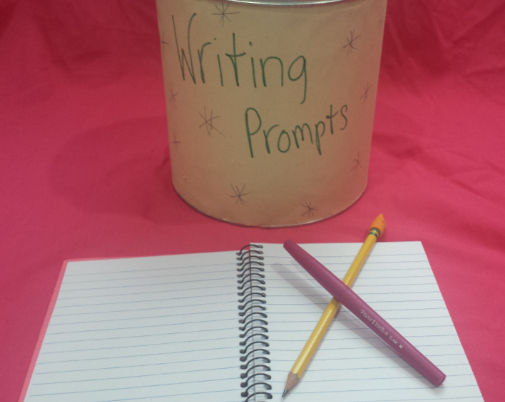40+ Journal Topics For Middle Schoolers
Middle school students often have a lot to say and LOVE opportunities to share their opinions and personal views. Use that sense of self to your advantage. Create writing prompts that appeal to them.
Here are 42 journal topics, by category, that are guaranteed to engage your middle schoolers.
Start Of The School Year
These topics will get your students
excited for the new academic year. They
will be ready to turn tasks that may seem impossible into accomplishments.
1. What are your academic goals for the
year?
2. What are your personal goals for the
year?
3. What is something you hope to learn
about this year?
Halloween
Many kids and teens (and adults!)
love this October holiday and the scary stories that go with it. Be cautious though as some of your students
may not celebrate Halloween for cultural reasons, while others may have a
genuine fear of the holiday. It may be
wise to provide an alternate topic, perhaps geared towards the season of
autumn, or a topic of choice.
4. Should students be allowed to wear
Halloween costumes to school? Explain
why or why not.
5. Should teachers be allowed to wear
Halloween costumes to school? Explain
why or why not.
6. How will you celebrate Halloween this
year?
7. What are some tips to stay safe while
trick-or-treating?
8. What is your favorite scary movie? Explain why.
9. Write a story using this opening
line: My friends and I were walking through a haunted house and…
10. Write a story using this opening
line: I took a shortcut on my walk home by going through the cemetery, but…
11. Write a story using this opening
line: I thought full moons were harmless, but…
12. Write a story using this opening
line: I was home alone on a rainy night, and I heard a strange noise…
Winter / Christmas / Hanukah
Students often look forward to the
festivities that accompany the winter holidays, both in and out of school. Be mindful that some students may not
celebrate these holidays, or may not honor them in the traditional sense. It is a good idea to provide an alternate
topic, perhaps geared towards the season of winter, or a topic of choice.
13. What are your plans for the holiday
break?
14. Explain what Christmas/Hanukah means
to you.
15. Describe your ideal Christmas/Hanukah. Include sensory details.
16. What is your favorite (or least
favorite) aspect of winter? Explain why.
17. What are your favorite activities to
do in the winter?
Valentine’s Day
Ah, the glorious, or perhaps
heartbreaking, time of crushes and young love.
Hearts. Cupid. Chocolates.
Cards. Flowers. These topics will cause students to
internally reflect and write from the heart – no pun intended.
18. Who are the people in your life that
you love? Explain why these people are
so important to you.
19. What does it mean to be in love?
20. Write a pretend letter to your crush. Include all of the things you admire about
him/her (you do not need to include his/her name so that your secret is safe).
Spring
The beginning of spring means there is
usually only one marking period left in the school year. While this fact often excited students, some
of them may be losing steam academically.
Assigning journal topics that allow students to be creative in their
responses will keep them interested.
21. What does springtime mean to you?
22. What is your favorite spring
holiday? Explain why.
23. What is your favorite (or least
favorite) aspect of spring? Explain why.
24. What are your favorite activities to
do in the spring? Explain why.
25. How might our lives be different if
the season of spring no longer exists?
Miscellaneous
When all else fails, or on days when you
want to assign a random writing prompt, choose from these miscellaneous journal
topics. These topics can also generate
engaging discussions.
26. If you could meet any fictional
character in real life, who would you choose?
Explain why.
27. Describe your ideal life 10 years
from now.
28. If you could take a vacation
anywhere, what location would you choose?
Explain why.
29. Imagine that you are on a deserted
island, what three items do you wish you had with you? Explain why you chose each of those items.
30. If someone offered you one million
dollars in exchange for not using any technology for one week, would you do it? Explain why or why not.
31. Explain what cause (such as keeping
the planet clean or curing all diseases) is most important to you.
32. Write the opening chapter to a book
about your life.
33. What are some ways that you could
improve your school?
34. What three qualities do you look for
in a friend? Explain why.
35. If you could have any superpower,
which one would you choose? Explain what
you would do with that power.
36. Imagine that you have the ability to
travel through time. Which would you
rather visit: the past or the future?
Explain why.
37. Who is your favorite celebrity? Explain why you admire him/her.
38. What is your favorite month of the
year? Explain why.
39. What is one of your weaknesses? What can you do to transform that weakness
into a strength?
40. What is one of your strengths? How can you use that ability to help others?
41. Do you believe that our destiny is
decided for us? Why or why not?
42. Write about the most exciting day of your life. What happened that made it so exciting? Include sensory details.
Of course, there is a virtually endless
list of journal topics to assign to your students, especially in the category
of “miscellaneous.” Topics can also be
related to content recently learned or a text recently read. Examples could be, “Imagine you are only
allowed to talk using figurative language.
Which type of figurative language would you use? Explain why” or “Which character do you
relate to the most from name of text?
Explain why.”
When writing prompts are relevant to the
curriculum, they can deepen students’ understanding of content and lead to a
mastery of skills. Also, the length of
the responses can vary to address specific purposes aligned with state
standards. Perhaps one informal
paragraph will suffice for the purpose of generating ideas. In another instance, that same short response
may be revisited at a later time to be expanded into a formal five-paragraph
essay, letter, or narrative.
Whichever way you choose to incorporate
writing prompts is a great way. By
encouraging the freedom to share opinions and thoughts, as well as creativity,
you are not only enhancing your students’ communication skills but are giving
them an outlet to be heard, even if only on paper.
What suggestions do you have for journal
topics? Leave a question, comment, or
suggestion below, in the Comments Section!
Please visit my Teachers Pay Teachers store to purchase a variety of resources for all grades and subjects!
Follow me on Instagram:
elathemissmway
Peace. Love.
Reading & Writing.
💗 Miss M





Comments
Post a Comment